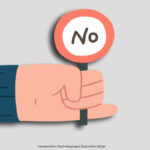
Adult relationships are complex. For them to flow, it is necessary for both parties to have the ability to express and deal with mutual frustrations. It is necessary for each person to be able to express their needs and find an attentive ear. But when a person is on the defensive he sees threats where there are none, so he cuts off any attempt at understanding.
When someone gets quickly and unreasonably defensive, he is sending a clear message: “back off, you are wrong”. At that moment, it is understandable that we feel confused because suddenly that person with whom we are trying to dialogue, probably to resolve a difference or conflict, assumes that we are his enemy.
At that precise moment the bridges of dialogue are broken and it is possible that your first reaction – with all the good intentions in the world – is to say: “you are getting defensive.” Big mistake.
Why is it a bad idea to tell someone on the defensive that they are on the defensive?
When a person becomes defensive, the mere mention of that attitude can escalate the situation even further. In fact, people who get defensive are probably aware that their attitude is a problem they need to fix, because they’ve probably heard it several times. But they can’t do it.
Therefore, reminding them that they are on the defensive is like digging deeper into the wound. They will feel more attacked, which will make them withdraw more into themselves and redouble their defensive reaction.
Ultimately, you must remember that one of the main reasons why a person is defensive is precisely the feeling of threat. The defensive reaction is often an attempt to protect a hurt ego.
Those who continually become defensive tend to have a very rigid mentality, which is why they often perceive criticism or even simple dissent as an attack. If you make them notice it, you will generate more resistance and make them close in on themselves to protect their own self-image and not have to accept mistakes or shadows of their own that they have conveniently pushed aside.
How to deal with a defensive person to gain real understanding
For a person to get defensive from time to time is perfectly normal, but if they never allow you to address the conflicts, differences, or dissatisfactions you have with them, it may become a problem. If disagreements are not addressed, they are likely to continue to grow, creating more and more frustration in the relationship.
1. Take a break
The first step in dealing with a defensive person is to pause for a few seconds as soon as you detect that attitude to stop your own reaction and prevent the situation from getting out of hand. You can even say, “give me a minute to reorder my thoughts.”
Of course, that response does not always come naturally nor is it easy to achieve, especially when you notice that you are being attacked since, after all, we all have a self-protective instinct. However, if you don’t want to get carried away, you need to stay in control of deciding what to do next.
2. Look inside yourself
Even if it is the other person who is responding with a defensive attitude, it is important that you do an introspection exercise. Before criticizing or addressing the reactions of others, it is best to develop self-awareness. Ask yourself: how do you usually react physically and emotionally to these types of situations? Do you lose patience and attack the other person or perhaps you feel rejected and back down? Do you take it personally or are you able to maintain a psychological distance?
Understanding your reactions to these situations will help you better manage your emotions, as well as clarify possible misunderstandings, so that you can dissipate tension to promote a more open and relaxed dialogue. In fact, maintaining a more open and receptive body language can help relax tensions.
3. Generate security
To treat a person who is defensive, it is important to understand that we all have a primary psychological need to be valued and accepted, to feel that we are good and valuable. We become defensive when these needs are threatened. For this reason, it is essential to create a climate in which the person feels understood, accepted, respected and safe.
To reduce defensiveness, instead of falling into a loop of recriminations and criticism, you should change your tone and emphasize the value of the other. Even if you don’t agree with his views or share his actions, you can give him the opportunity to express himself in an environment where he feels safe and comfortable talking about the issue that concerns you.
4. Change your perspective
When a person reacts by becoming defensive, they are likely to attack you too. Avoid perceiving him as an enemy because that will only increase the tension. First, try to change your perspective and look at him with compassion, knowing that in reality his reaction does not have much to do with you, but rather is the result of his own insecurities and latent unresolved conflicts.
Trying to understand that person with a receptive and empathetic attitude will open a path for dialogue. You can ask: “Please help me understand what bothers you.” Often that is enough to defuse defensiveness.
5. Focus on the solution
When a person is defensive, it is common for the discussion to derail. In fact, in many cases that is precisely the goal of defensiveness: to avoid addressing the problem. Therefore, if you want to solve a difference, you will have to make sure that you do not lose sight of it at any time.
When the person lowers their defenses a little and is more open to dialogue, you can try asking questions like: “How can we solve this?” or “What could be the next steps?”. The idea is that you can both compromise and collaborate to resolve the problem or differences.
Finally, remember that relationships provide us with opportunities to grow by becoming more tolerant, open and empathetic. Defensive behavior could be another opportunity to bring out the best in ourselves. The decision remains in our hands.



